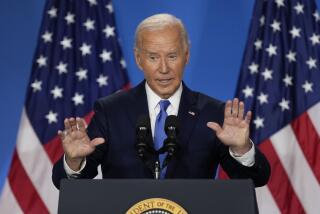Astaphan Also May End Up a Loser From the Ben Johnson Drug Scandal
- Share via
TORONTO — Ben Johnson’s doctor concluded his testimony Wednesday after 5 1/2 days before the Canadian government’s inquiry into drug use by athletes, the fate of his medical practice in Canada apparently in the hands of the commissioner, Justice Charles L. Dubin.
Jamie Astaphan left the hearing room without commenting to reporters, but his attorney, David Sookram, said that he is not concerned about whether anyone but Dubin believes in Astaphan’s fitness to practice medicine.
Astaphan’s treatment of patients, as well as his ethics and credibility, were challenged while he was on the stand by attorneys for the Sports Medicine Council of Canada, the Ontario College of Physicians and Surgeons, and Johnson.
“The only thing that matters is how the evidence strikes the commissioner,” Sookram said. “I’m not concerned until the commissioner decides.”
Dubin, an Ontario associate chief justice, is not expected to submit his report to the federal government until several months after the hearings conclude later this year. His recommendations are expected to have some bearing on whether Astaphan is allowed to retain his medical license in Canada. If Dubin’s remarks Wednesday are any indication, he was not favorably impressed by Astaphan’s testimony.
By acquiring steroids and other banned substances for athletes, sometimes from the black market, Dubin said, Astaphan was “advancing their athletic careers but leading them down a garden path of moral standards and values which could have an effect on them in their future lives.”
Astaphan objected, telling Dubin that the athletes were “already on that path” and that he acted in their best interests by assuring that they were medically supervised.
But, Dubin suggested that Astaphan should have had higher standards. “You were a doctor, you were helping them, you were giving them a sense of security,” he said. “It wasn’t just medication. You were encouraging them, Doctor, and giving them comfort. They must have thought it would be all right if a doctor was giving it to them.”
Three other witnesses followed Astaphan to the stand Wednesday, among them a former Canadian shotput champion who said steroid use among shotputters and discus throwers at the college level was “extremely prevalent” during the five years he attended Clemson University.
Mike Spiritoso estimated that of the top 20 to 30 National Collegiate Athletic Assn. shotputters and discus throwers from 1982 through 1987, 90% to 95% used steroids.
“If they were any good, even if they weren’t any good, it was well known they were taking the stuff,” he said.
Spiritoso finished second in the NCAA outdoor meet in 1986, tested positive for a banned substance at the Canadian outdoor championships later that summer and was disqualified from competing internationally for two years. But he still was allowed under collegiate rules to compete at Clemson in 1987, when he finished second in the NCAA indoor meet.
After Astaphan, 43, left the hearing room, he was followed onto the street in an exclusive shopping area by a crowd of television cameramen and reporters. At one point, he ducked into a toy store for temporary relief. The media mob waited on the sidewalk, standing in a shower of soap bubbles being blown by a toy bear on display outside the store.
Astaphan is expected to return today to his native Caribbean island of St. Kitts, where he has a medical practice. But Sookram said that his client eventually would like to resume his Toronto practice, which he discontinued in 1986.
Meantime, Sookram said, Astaphan “has got to pick up his life and get on with it. It’s not just him. Everybody who has been caught up in this web has to stop and take stock of himself before deciding how to proceed.”
Asked by reporters if he believes Astaphan gained or lost by volunteering to testify, Sookram said: “We are all losers. The public lost a hero (Johnson). The lawyers lost a lot of time. A lot of good people have had their names besmirched.
“But Canadians are brave people. We were the only people who had the guts and the courage to clean house.”
More to Read
Go beyond the scoreboard
Get the latest on L.A.'s teams in the daily Sports Report newsletter.
You may occasionally receive promotional content from the Los Angeles Times.










